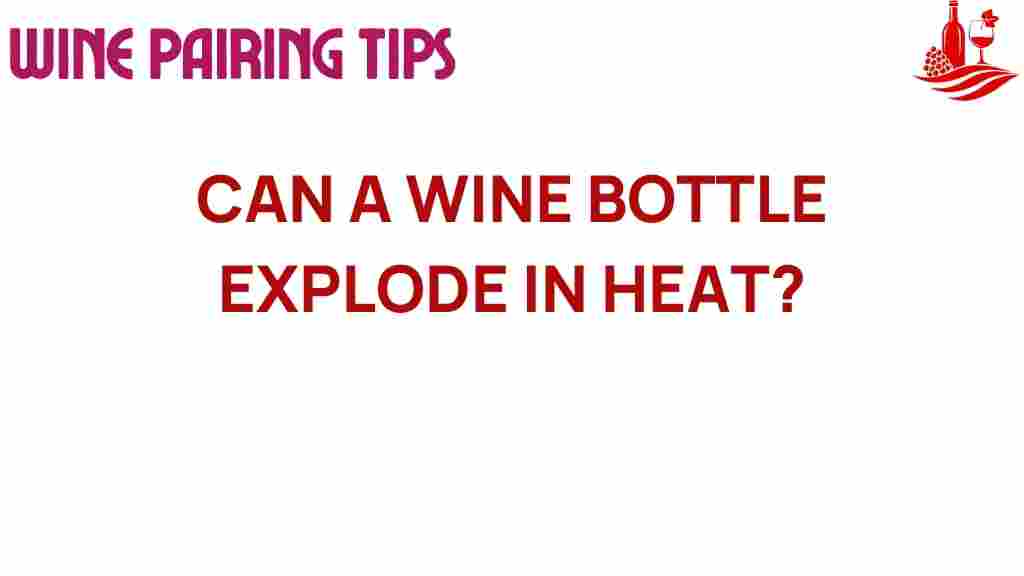Can a Wine Bottle Really Explode in Heat? Uncovering the Truth
Wine enthusiasts often express concerns about the safety of their beloved bottles, particularly when it comes to storing them in heat. One prevalent myth is the possibility of a wine explosion due to elevated temperatures. In this article, we will delve into the effects of heat on wine, exploring how temperature can influence bottle pressure, wine preservation, and ultimately the integrity of the wine bottle itself. We aim to separate fact from myth and provide you with vital information on wine safety and storage.
Understanding Wine Storage and Heat Effects
When it comes to wine storage, temperature plays a crucial role in maintaining the quality and safety of the wine. Here are some key aspects to consider:
- Ideal Storage Temperature: The optimal temperature for storing wine is typically between 45°F to 65°F (7°C to 18°C). Higher temperatures can lead to various issues.
- Heat Effects: Prolonged exposure to heat can adversely affect the wine’s flavor and aroma. It can also cause chemical reactions that lead to spoilage.
- Bottle Pressure: As temperature rises, the pressure inside the wine bottle increases. This can lead to cork displacement or even bottle bursting in extreme cases.
How Heat Affects Wine Quality
Heat can bring about several detrimental changes in wine:
- Oxidation: Higher temperatures accelerate the oxidation process, which can result in a flat taste and loss of fruitiness.
- Volatility: The heat can increase the volatility of certain compounds within the wine, potentially leading to unpleasant aromas.
- Cork Integrity: Excessive heat can dry out corks, allowing air to seep into the bottle and spoil the wine.
Can Bottles Actually Explode?
The short answer is yes, but the conditions must be extreme. A wine explosion can occur due to excessive heat leading to increased pressure inside the bottle. Here’s a closer look at the factors that contribute to this phenomenon:
Factors Leading to a Wine Explosion
- High Temperature: When a wine bottle is exposed to temperatures above 75°F (24°C) for prolonged periods, the risk of explosion increases.
- Carbonated Wines: Sparkling wines, such as Champagne, have higher internal pressure due to carbonation, making them more susceptible to explosions in heat.
- Storage Conditions: Storing wine in places like a hot car, near an oven, or in direct sunlight can create the perfect storm for a bottle to explode.
Step-by-Step: Ensuring Safe Wine Storage
To avoid the risks associated with heat and ensure the preservation of your wine, follow these steps:
1. Choose the Right Storage Location
Select a cool, dark place for storing your wine. Avoid areas with fluctuating temperatures, such as kitchens or garages.
2. Maintain Consistent Temperature
Keep the storage temperature between 50°F to 58°F (10°C to 14°C) for most wines. Use a wine cooler if necessary.
3. Monitor Humidity Levels
Ideal humidity for wine storage is around 70%. This prevents corks from drying out and allows for proper preservation of the wine.
4. Avoid Direct Sunlight
Light, especially UV light, can degrade wine quality. Store bottles in a dark location or use UV-resistant wine cabinets.
5. Regularly Check Bottles
Inspect your wine bottles for any signs of cork damage or leakage. A compromised cork can lead to spoilage.
Troubleshooting Tips for Wine Safety
If you suspect your wine has been exposed to heat, here are some troubleshooting tips:
- Check Cork Condition: Inspect the cork for signs of dryness or damage.
- Smell the Wine: If the wine smells off or has a vinegar-like aroma, it may have spoiled.
- Taste Test: If you’re unsure, taste a small amount. If it tastes flat or unpleasant, it may be best to discard it.
Debunking Common Wine Myths
There are many myths surrounding wine storage and safety. Here are a few to clarify:
- Myth: All wines need to be stored in a wine cellar.
Fact: While a wine cellar is ideal, wines can be stored safely in a cool, dark closet or a dedicated wine fridge. - Myth: You can store wine at room temperature indefinitely.
Fact: Room temperature can vary; prolonged exposure to higher temperatures can damage wine. - Myth: Corked wine is always spoiled.
Fact: Not all corked wines are ruined; some may still be drinkable.
Preserving Wine Quality: Best Practices
To ensure the best quality of your wine, consider these preservation techniques:
- Keep Bottles Upright: Store wine bottles upright to prevent the wine from contacting the cork, which can lead to spoilage.
- Use Wine Stoppers: After opening a bottle, use a wine stopper to preserve freshness.
- Invest in a Wine Fridge: For serious wine collectors, a wine fridge offers optimal storage conditions.
Conclusion: Wine Safety and Storage Matters
In conclusion, while a wine explosion due to heat is a possibility, it typically requires extreme conditions. By understanding the effects of heat on wine and following best practices for wine storage, you can mitigate risks and ensure that your wine remains safe and enjoyable. Remember that the integrity of a wine bottle is crucial for preserving its quality, so prioritize the right storage conditions to protect your investment.
For more information on wine preservation and storage, you can visit this helpful resource. Additionally, if you have any more questions about wine myths and safety practices, check out our other articles here.
This article is in the category Tips and created by Wine Pairing Tips Team
